牛津译林版八年级上册 Unit 4 Do it yourself Grammar Giving instructions 课件 (共29张PPT)
文档属性
| 名称 | 牛津译林版八年级上册 Unit 4 Do it yourself Grammar Giving instructions 课件 (共29张PPT) |  | |
| 格式 | ppt | ||
| 文件大小 | 4.9MB | ||
| 资源类型 | 教案 | ||
| 版本资源 | 牛津译林版 | ||
| 科目 | 英语 | ||
| 更新时间 | 2022-11-15 16:15:00 | ||
图片预览

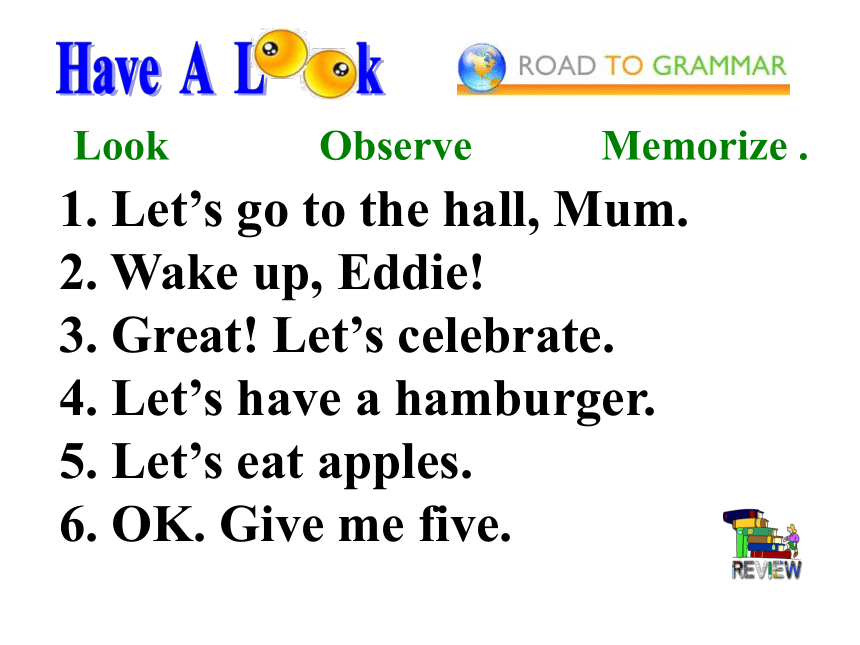

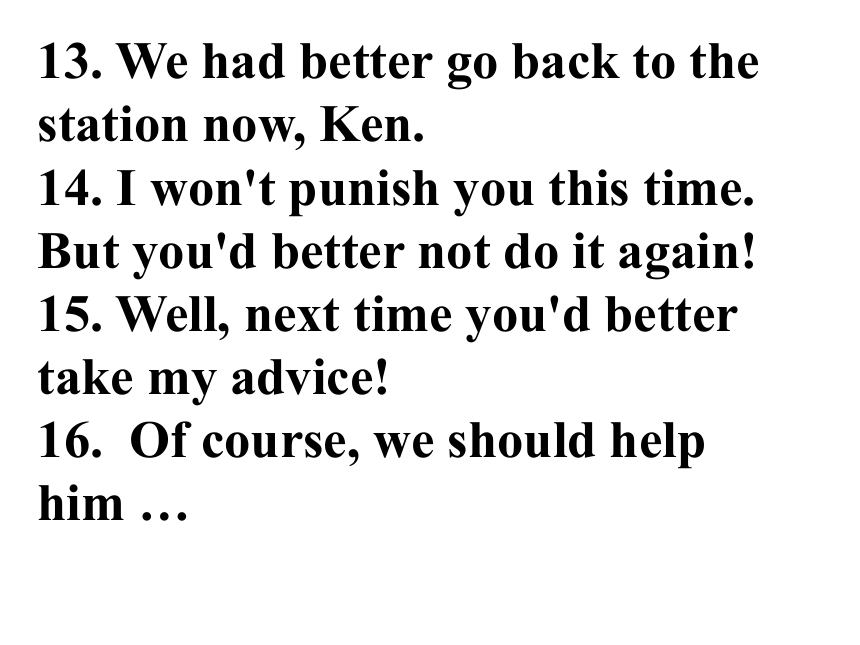

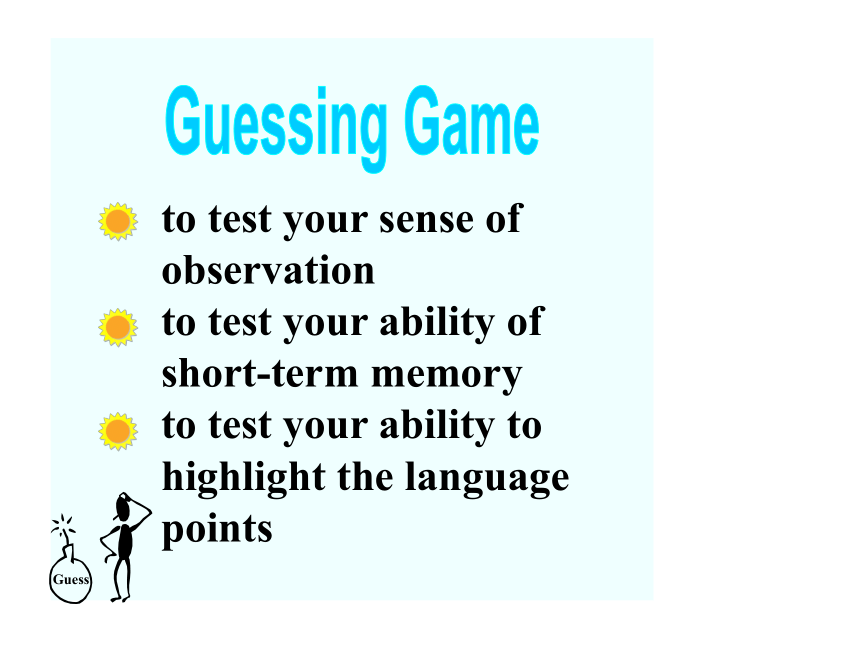
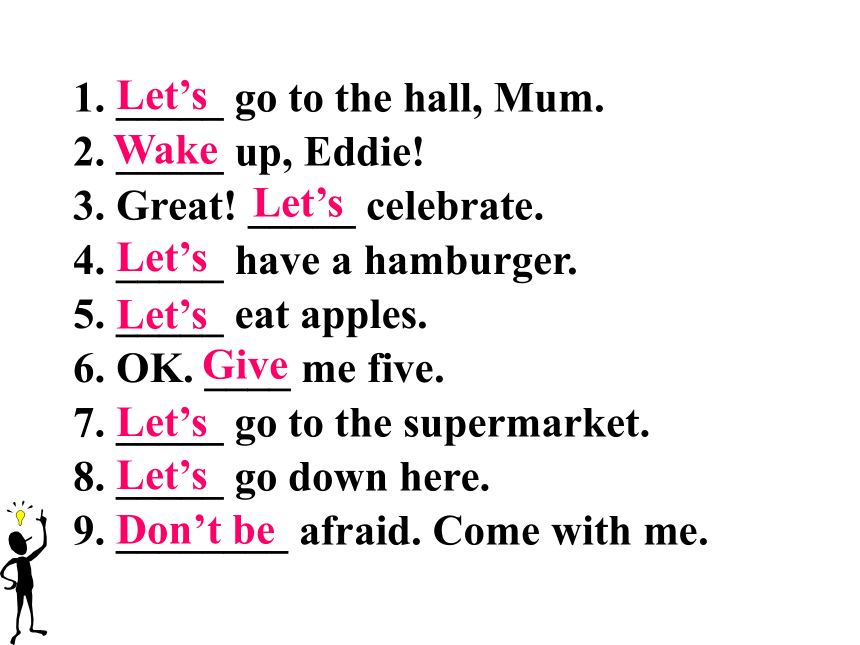
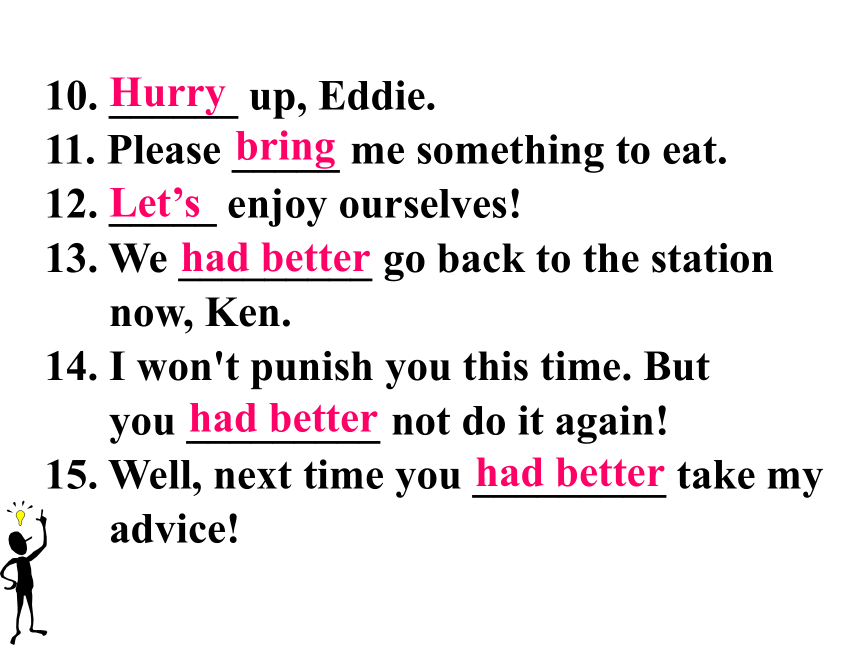
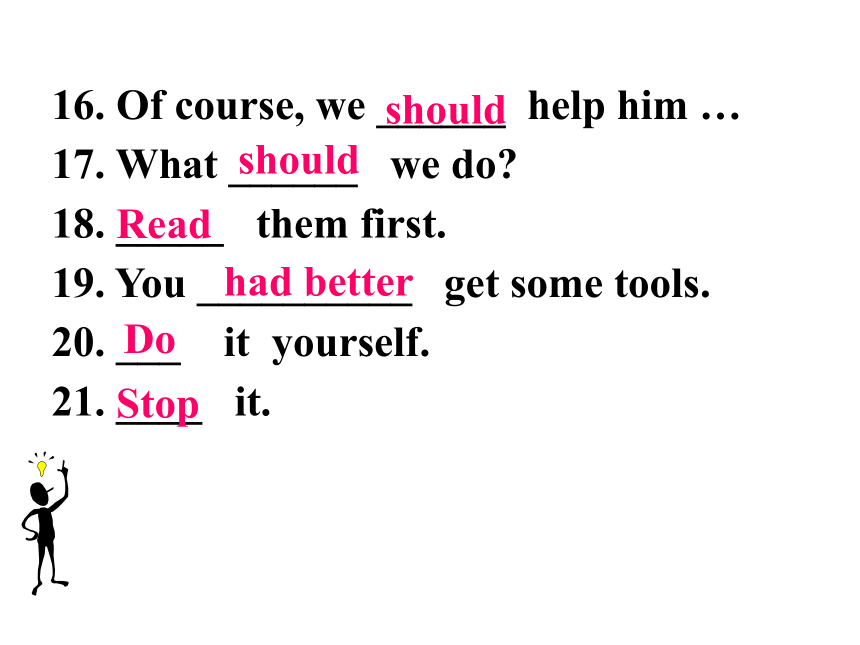
文档简介
(共29张PPT)
Grammar
Look Observe Memorize .
1. Let’s go to the hall, Mum.
2. Wake up, Eddie!
3. Great! Let’s celebrate.
4. Let’s have a hamburger.
5. Let’s eat apples.
6. OK. Give me five.
7. Let’s go to the supermarket.
8. Let’s go down here.
9. Don’t be e with me.
10. Hurry up, Eddie.
11. Please bring me something to eat.
12. Let’s enjoy ourselves!
13. We had better go back to the station now, Ken.
14. I won't punish you this time. But you'd better not do it again!
15. Well, next time you'd better take my advice!
16. Of course, we should help him …
Sentences from this unit:
1. What should we do
2. Read them first.
3. You’d better get some tools.
4. Do it yourself.
5. Stop it.
to test your sense of observation
to test your ability of short-term memory
to test your ability to highlight the language points
Guess
1. _____ go to the hall, Mum.
2. _____ up, Eddie!
3. Great! _____ celebrate.
4. _____ have a hamburger.
5. _____ eat apples.
6. OK. ____ me five.
7. _____ go to the supermarket.
8. _____ go down here.
9. ________ e with me.
Let’s
Wake
Let’s
Let’s
Let’s
Give
Let’s
Let’s
Don’t be
10. ______ up, Eddie.
11. Please _____ me something to eat.
12. _____ enjoy ourselves!
13. We _________ go back to the station
now, Ken.
14. I won't punish you this time. But
you _________ not do it again!
15. Well, next time you _________ take my
advice!
Hurry
bring
Let’s
had better
had better
had better
16. Of course, we ______ help him …
17. What ______ we do
18. _____ them first.
19. You __________ get some tools.
20. ___ it yourself.
21. ____ it.
should
should
Read
had better
Do
Stop
To learn to give instructions
To learn to use should & had better
Objectives
Kate, _______ your homework here tomorrow. A. bring B. brings
C. to bring D. bringing You had better _______ on your coat. A. to put B. putting C. to putting D. put
Further study
1. 祈使句的概念
祈使句表示请求、命令等。它的主语是you(听话人),通常不说出。祈使句肯定结构中的谓语动词一律用动词原形。祈使句末用惊叹号或句号,句子用降调。
2. 祈使句的结构
1) 祈使句的肯定结构
① Do型(以行为动词原形开头),例如: Sit down!?坐下! Stand up!?起立!
② Be型(以be开头),例如: Be quiet!?安静!
Be careful!小心!
③ Let型(以let开头),例如: Let me try. 让我试试看。 Let’s look at the map. 让我们看看地图。
● let’s是let us的简略式。
● 表示请求、劝告的祈使句还常常在句前或句末加上please, 构成句式:Please …或 …, please. 以使语气更加缓和或客气。例如: Please stand up. 或
Stand up, please. 请站起来。 Please have a rest. 或
Have a rest, please. 请休息一下。
2) 祈使句的否定结构,一律在肯定结构前加 Do not (Don’t)。例如: Don’t go there, please. 请别去那儿。
Don’t be late for class! 上课别迟到!
Don’t let him in. 不要让他进来。
注意:Let’s型祈使句,其否定式也可用 Let’s not …,例如: Let’s not have rest. 咱们别休息了。 Let’s not sit here! 我们不要坐在这儿!
当我们给他人提建议时,可以用had better和should,表示“最好”或“应该”做某事, had better的语气比should强一些。
You had better draw the picture with these crayons.
你最好用这些蜡笔画这幅画。
You should exercise more.
你应该多锻炼。
had better (常简略为’d better),是一固定词组,后面必须跟动词原形,没有人称和数的变化。构成:had better do sth. 句型。
You’d better go to hospital at once.
你最好立即去医院看病。 Tom, you’d better go there today.
汤姆,你最好今天去那儿。
had better 的否定式是将not直接放在had better的后面。
You had better not miss the last bus.
你最好不要错过末班公共汽车。
should 后面也要跟动词原形,且没有人称和数的变化。
You should stop smoking.
你应该戒烟。
should 的否定式是should not/shouldn’t。
You shouldn’t drive after drinking.
你不应该喝酒后开车。
1. 当我们向他人发出命令、提出要求或建
议时,常使用祈使句。其主语通常不明
确表示出来。其否定形式是在动词原形
前加do not/don’t。为了表示客气和礼
貌,可以加上please。
2. 当我们给他人提建议时,可以用had
better和should,表示“最好”或“应该”做
某事。否定形式是had better not和
should not/shouldn’t。
请点击
I. 单项选择。
1. The TV is too loud. Please _______. A. turn it down B. to turn it down
C. turn down it D. to turn down it 2. _______ late again, Bill! A. Don't to be B. Don't be
C. Not be D. Be not
3. _______ cross the road until the traffic
lights turn green. A. Not B. Won't
C. Doesn't D. Don't 4. _______ me the truth, or I'll be angry. A. Telling B. To tell
C. Told D. Tell
II. 句型转换。
1. Will you please read it again more slowly
(改为祈使句) _______ again more slowly, please. 2. If you don't listen to me, I'll go.
(改为同义句) ________ me, or I'll go. 3. The teachers often tell the students not to
be careless. (改为祈使句) ________ careless, please. 4. Please sit next to Nancy. (改为否定句) ________ next to Nancy.
Read it
Listen to
Don't be
Don't sit
III. 完成句子。
1. 你应该在南京换火车。
__________ change trains at Nanjing.
2. 你最好在下雨前回家。
___________________ before the rain
starts.
3. 现在你最好别打棒球了。
_____________________ baseball now.
4. 不要把金鱼放在阳光下。
_________ the goldfish in the sun.
You should
You'd better go home
You had better not play
Don’t put
Grammar
Look Observe Memorize .
1. Let’s go to the hall, Mum.
2. Wake up, Eddie!
3. Great! Let’s celebrate.
4. Let’s have a hamburger.
5. Let’s eat apples.
6. OK. Give me five.
7. Let’s go to the supermarket.
8. Let’s go down here.
9. Don’t be e with me.
10. Hurry up, Eddie.
11. Please bring me something to eat.
12. Let’s enjoy ourselves!
13. We had better go back to the station now, Ken.
14. I won't punish you this time. But you'd better not do it again!
15. Well, next time you'd better take my advice!
16. Of course, we should help him …
Sentences from this unit:
1. What should we do
2. Read them first.
3. You’d better get some tools.
4. Do it yourself.
5. Stop it.
to test your sense of observation
to test your ability of short-term memory
to test your ability to highlight the language points
Guess
1. _____ go to the hall, Mum.
2. _____ up, Eddie!
3. Great! _____ celebrate.
4. _____ have a hamburger.
5. _____ eat apples.
6. OK. ____ me five.
7. _____ go to the supermarket.
8. _____ go down here.
9. ________ e with me.
Let’s
Wake
Let’s
Let’s
Let’s
Give
Let’s
Let’s
Don’t be
10. ______ up, Eddie.
11. Please _____ me something to eat.
12. _____ enjoy ourselves!
13. We _________ go back to the station
now, Ken.
14. I won't punish you this time. But
you _________ not do it again!
15. Well, next time you _________ take my
advice!
Hurry
bring
Let’s
had better
had better
had better
16. Of course, we ______ help him …
17. What ______ we do
18. _____ them first.
19. You __________ get some tools.
20. ___ it yourself.
21. ____ it.
should
should
Read
had better
Do
Stop
To learn to give instructions
To learn to use should & had better
Objectives
Kate, _______ your homework here tomorrow. A. bring B. brings
C. to bring D. bringing You had better _______ on your coat. A. to put B. putting C. to putting D. put
Further study
1. 祈使句的概念
祈使句表示请求、命令等。它的主语是you(听话人),通常不说出。祈使句肯定结构中的谓语动词一律用动词原形。祈使句末用惊叹号或句号,句子用降调。
2. 祈使句的结构
1) 祈使句的肯定结构
① Do型(以行为动词原形开头),例如: Sit down!?坐下! Stand up!?起立!
② Be型(以be开头),例如: Be quiet!?安静!
Be careful!小心!
③ Let型(以let开头),例如: Let me try. 让我试试看。 Let’s look at the map. 让我们看看地图。
● let’s是let us的简略式。
● 表示请求、劝告的祈使句还常常在句前或句末加上please, 构成句式:Please …或 …, please. 以使语气更加缓和或客气。例如: Please stand up. 或
Stand up, please. 请站起来。 Please have a rest. 或
Have a rest, please. 请休息一下。
2) 祈使句的否定结构,一律在肯定结构前加 Do not (Don’t)。例如: Don’t go there, please. 请别去那儿。
Don’t be late for class! 上课别迟到!
Don’t let him in. 不要让他进来。
注意:Let’s型祈使句,其否定式也可用 Let’s not …,例如: Let’s not have rest. 咱们别休息了。 Let’s not sit here! 我们不要坐在这儿!
当我们给他人提建议时,可以用had better和should,表示“最好”或“应该”做某事, had better的语气比should强一些。
You had better draw the picture with these crayons.
你最好用这些蜡笔画这幅画。
You should exercise more.
你应该多锻炼。
had better (常简略为’d better),是一固定词组,后面必须跟动词原形,没有人称和数的变化。构成:had better do sth. 句型。
You’d better go to hospital at once.
你最好立即去医院看病。 Tom, you’d better go there today.
汤姆,你最好今天去那儿。
had better 的否定式是将not直接放在had better的后面。
You had better not miss the last bus.
你最好不要错过末班公共汽车。
should 后面也要跟动词原形,且没有人称和数的变化。
You should stop smoking.
你应该戒烟。
should 的否定式是should not/shouldn’t。
You shouldn’t drive after drinking.
你不应该喝酒后开车。
1. 当我们向他人发出命令、提出要求或建
议时,常使用祈使句。其主语通常不明
确表示出来。其否定形式是在动词原形
前加do not/don’t。为了表示客气和礼
貌,可以加上please。
2. 当我们给他人提建议时,可以用had
better和should,表示“最好”或“应该”做
某事。否定形式是had better not和
should not/shouldn’t。
请点击
I. 单项选择。
1. The TV is too loud. Please _______. A. turn it down B. to turn it down
C. turn down it D. to turn down it 2. _______ late again, Bill! A. Don't to be B. Don't be
C. Not be D. Be not
3. _______ cross the road until the traffic
lights turn green. A. Not B. Won't
C. Doesn't D. Don't 4. _______ me the truth, or I'll be angry. A. Telling B. To tell
C. Told D. Tell
II. 句型转换。
1. Will you please read it again more slowly
(改为祈使句) _______ again more slowly, please. 2. If you don't listen to me, I'll go.
(改为同义句) ________ me, or I'll go. 3. The teachers often tell the students not to
be careless. (改为祈使句) ________ careless, please. 4. Please sit next to Nancy. (改为否定句) ________ next to Nancy.
Read it
Listen to
Don't be
Don't sit
III. 完成句子。
1. 你应该在南京换火车。
__________ change trains at Nanjing.
2. 你最好在下雨前回家。
___________________ before the rain
starts.
3. 现在你最好别打棒球了。
_____________________ baseball now.
4. 不要把金鱼放在阳光下。
_________ the goldfish in the sun.
You should
You'd better go home
You had better not play
Don’t put
